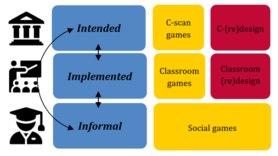Hidden Curriculum
This project develops a toolbox to help unpack, expose, materialize, and challenge the hidden curriculum (HC). This exposition and challenging of the HC will foster education that no longer disadvantages students for their lacking familiarity with prevalent university norms and formalizes socialization processes that have thus far remained mostly implicit.
Background
The hidden curriculum (HC) has been at the centre of academic discourse for over half a century (Jackson, 1968). Defined as the unwritten social and cultural rules in education, in terms of behavioural expectations and practices, cultural values, power dynamics, and (civic) responsibility (Laiduc & Covarrubias, 2022), the HC as a concept gives attention to (and enables critical exploration of) the implicit aspects of our curriculum and how these implicit aspects result in learning outcomes at odds with, or in addition to the explicitly defined curriculum.
Because the HC is notoriously difficult to address, there has not been a registered large-scale attempt at UU to reveal the HC and study its impact. Exposing the HC requires small-scale, local interventions that make the (inter)personal an explicit part of the curriculum. This project takes on this challenge and proposes to unpack, expose, and question the HC at UU through an innovative method that lowers the barriers for students and teachers to bring the (inter)personal into the curriculum, and supports the creation of a fair and more balanced set of educational “rules”.
Project and aims
This project aims to develop a toolbox with a series of small- to large-scale analogue games and game design exercises to bring together students and teachers and support them in unpacking and exposing the HC at different levels of the curriculum. The toolkit will consist of interventions at the level of the intended, implemented and informal curriculum.

Figure 1: Overview of the interventions per level of curriculum.
- At the level of the intended curriculum, these interventions expose, compare and align expectations from students and staff in relation to the programme’s learning objectives.
- At the level of the implemented curriculum, they materialize and renegotiate the classroom rules and help identify what it takes to traverse those rules successfully.
- At the level of the informal curriculum, they support (soon-to-be) students to develop cultural capital to more successfully partake in UUs education.
Exposing the HC promises to positively impact education in two domains: socialization and inclusivity. This project shares ambitions with related interfaculty USO projects on developing an inclusive curriculum and fostering a sense of belonging since exposing the HC can contribute to these aims.
Results
References
- Jackson, P. W. (1968). Life in classrooms. New York: Teachers College Press.
- Laiduc, G. & Covarrubias, R. (2022). Making meaning of the hidden curriculum: Translating wise interventions to usher university change. Translational issues in psychological science, 8 (2), 221-233.
